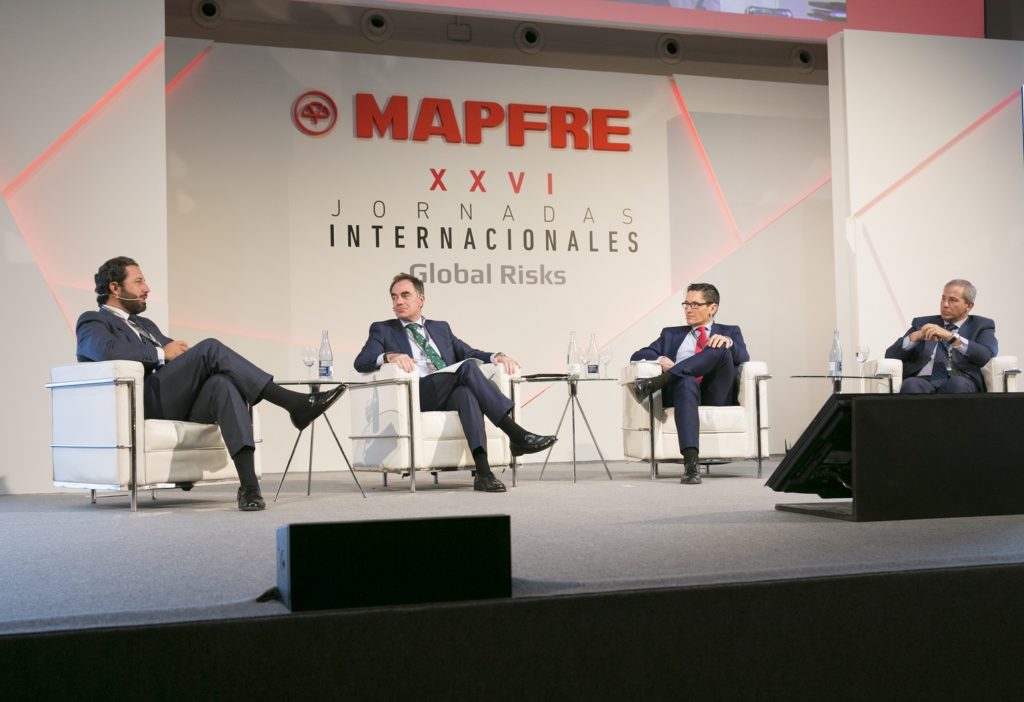admin | 12/05/2020
“Appraisers need to create trust with each party in an appraisal. This is only achieved by being transparent and informative.”
Addvalora Global Corporate & Specialties is dedicated to appraisal and management of serious and complex international claims and has worked with MAPFRE Global Risks on multiple occasions.
If management of an ordinary claim can have a number of complications, when talking about large international claims, the situation can become even more complex. Different currencies and the application of various regulations are added to the multiplication of the parties involved, who are often from different countries and have their own specific characteristics, means transparency is a key factor throughout the management process.
In this interview, Addvalora CEO Ignacio Lorenzo Toimil analyzed the aspects that he believes are essential to mitigating these difficulties and achieving an agile, satisfactory resolution for all parties.
1) Based on your experience, what factors do you consider to be the most valued in claims management from the standpoint of an insured company?
Although each company can have its own indicators, in my experience, insured companies generally place great value on their claims being handled with agility, transparency, and objectivity.
In terms of agility, two factors are taken into account. First, that insurance companies should not delay management due to a request for excessive documentation. And second, that once the documentation is submitted, delays should not occur with the insurance company when responding to the policyholder with the conclusions.

For the client company, it is also important that its insurance company provide support from the very minute an incident occurs. First, to share knowledge with the client, as the insurance company can use its experience to help minimize the incident, and second, because the client is interested in the insurance company’s preliminary opinion on how the contract will work. The initial moment is essential to the claim’s future course, because that is when each party develops its assumptions on how it expects the policy to operate in this event. If the assumptions of each party do not align, it is important not to let too much time pass before everyone is brought together on common ground, explaining to each party its preliminary position regarding the event to prevent difficulties from arising in management. Clearly, if complete information is not available in that phase, opinions must be expressed prudently. But the key is to be transparent from the very start.
With regards to objectivity, policyholders expect that the proposed compensation include everything that favors or is detrimental to them; that is, they expect the proposed compensation to be fair.
2) In your opinion, what is the greatest challenge faced by an appraiser who works in the field of large international claims?
Appraisers, for any claim, have the challenge of ensuring that the parties involved consider management to be agile, transparent, and objective. For an international claim, that challenge does not change. Expectations remain the same. What does change is that management becomes more complex by doubling the number of parties involved (two representatives for the policyholder, for the broker, and for the insurance company) and/or because various regulations apply—the local regulation and the regulations where the master policy was created.
Personally, I believe that, to mitigate these two factors, it is very helpful to have a local presence with local teams that understand the country’s specific characteristics and that are close to the location of the incident. And, of course, there should be excellent coordination between the various teams involved. I believe that the world and organizations have become globalized, but coordination and the way teams in different countries work together has not changed at the same rate. This is the major challenge faced by every organization.
It is very helpful to have a local presence with local teams that understand the country’s specific characteristics and that are close to the location of the incident. And, of course, there should be excellent coordination between the various teams involved.
3) Addvalora provides services in very different sectors (energy, engineering and construction, aviation, environment, profit loss, and others). Do you believe any of these is more difficult from an appraisal standpoint?
Problems in claims are caused fundamentally by three things: determination of the cause, because it is what decides whether or not the claim is covered; damage and loss assessment; and interpretation of the contract.
Consequently, claims from hurricanes or earthquakes are less problematic than claims caused by a design mistake in the fields of energy, engineering, or construction. Aviation claims also have fewer problems from an assessment standpoint, as it is an agreed value, than a claim for a loss of profit, where you have to work in the field of estimates on what could have happened, leaving room for interpretation.
4) For large international claims, several currencies can be involved, with their corresponding fluctuations in exchange rates. This can mean there is a considerable difference in the loss amounts depending on the exchange rate used and when the conversion was done. How do you manage this issue between the parties?
Many of the problems that arise in claims are easily avoidable if they are anticipated when the policy is taken out. Differences in exchange rates is one of them, but it is not a difficult problem to foresee if investments are held in countries with volatile exchange rates. So, if the date used for the exchange rate is established in advance because it is defined in the policy or in the claim protocol, or it is based on past claims, then there is no problem. The problem arises when it was not anticipated while taking out the policy and a solution must be provided during the claim.
5) How do you ensure a client trusts an appraisal to be objective? What aspects are important in the field of appraisal to gain a client’s trust?
Appraisers need to create trust with each party in an appraisal. This is only achieved by being transparent and informative. This condition is not exclusive to appraisals. It is true in every aspect of life. To that end, appraisers need to be very familiar with what they are facing. They must be experienced and specialized.
6) What factors do you believe help to improve efficiency in management?

A policy is nothing more than a promise of payment in which a company agrees to pay if an incident occurs one day that is planned for in the contract’s coverage. Given that it is a promise, each party will have its expectation on how it works. This in itself creates uncertainty.
So, it is essential to remove uncertainty for claims to be managed properly. We can remove uncertainty when policies are being purchased and during a claim.
When taking out a policy, it is essential that the parties to the contract clearly understand which risks are being transferred and which are being assumed. In other words, the parties must know what they are agreeing to. Much of the “pre-claim” uncertainty can also be removed at that time by determining selection of the parties involved, performing a stress test on the policy to see how it works, or with contingency plans and action protocols.
To avoid uncertainty during the claim phase, the process must be given the highest level of transparency. If the expectations of all parties involved are aligned from the start, it is highly probable that the claim will be resolved successfully.
In this regard, what role do claim protocols play?
A very important one. They are essential to removing uncertainty. I can guarantee that the policies with claim protocols work better than those that do not have them. Notwithstanding this, I believe much more work can be done regarding the information included in them. For example, you cannot predict what documentation will be requested for each type of claim.
7) What impact has the technological advancement in the various industries had from an appraisal standpoint?
Essentially, I believe it has made the process more agile.
Before, in a large fire, you would have to wait several days to access the risk site. Today we can use a drone to attain a much clearer view of what happened and its consequences. Process automation and the use of new tools, such as remote appraisals, have also given high-frequency claims greater agility, reducing times to close claims, leading to improved client satisfaction.
8) What do you see in the future of appraisal work? What trends are setting the course for this profession?
The appraisal sector, particularly in claims for smaller amounts, will have to reinvent itself, because the new tools are automating processes. This reinvention clearly involves finding a way to continue providing added value in claims. This issue is not exclusive to the appraisal sector, rather it is affecting practically every sector of production.
For claims of smaller amounts, I believe process automation is more difficult. However, as appraisers, we must take advantage of these new tools to give them greater agility.
9) Lastly, what is your view of the collaboration with MAPFRE Global Risks? What do you feel the synergy between professionals from both companies brings to clients
In the same way that an appraiser must generate trust, a client wants to be insured with an insurance company that gives them trust, not only from a financial standpoint—because it has a good rating and can respond in the event of a claim—rather because it has a specialized technical team that provides quality advice when purchasing a policy and manages claims well with agility, objectivity, and transparency.
Our relationship with MAPFRE, and specifically with the Global Risks Unit, is one of complete collaboration. Over the years, we have seen that they are an excellent, very professional team who know the business perfectly well. This produces a great deal of trust, and I am certain that the market sees it the same way we do.
Professional profile:

Ignacio has a degree in Economics from the University of Santiago de Compostela, and an MBA from the Pontifical University of Comillas ICAI – ICADE. Following several years working in the management control and finance departments at a multinational in the food sector and a multinational engineering company dedicated to turnkey projects for urban waste collection, in 2006 he began his career with the Addvalora Group as a senior appraiser specializing in profit loss. He is currently CEO of the Corporate & Specialty business, which covers specialties and complex claims, as well as the group’s international area. He is also a member of the Addvalora Group’s Board of Directors.





